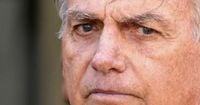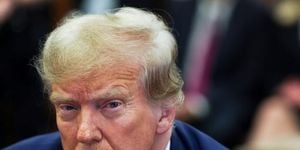Brazil finds itself at a dramatic crossroads as former President Jair Bolsonaro faces a barrage of legal challenges that could reshape the country’s political landscape—and perhaps test the very limits of its democratic institutions. With federal police alleging money laundering, obstruction of justice, and plotting to subvert the 2022 election, Bolsonaro’s fate now hangs in the balance as the Supreme Court prepares to deliver its verdict in early September 2025. The story is as much about the man as it is about the resilience of Brazil’s democracy under unprecedented strain.
According to documents obtained by Associated Press, Brazilian federal police accuse Bolsonaro of receiving more than 30 million reais (about $5 million) between March 2023 and February 2024, most of it without apparent justification. The majority of these funds—nearly 20 million reais ($3.48 million)—were funneled through over 1.2 million direct transactions known as PIX. Investigators say Bolsonaro spent a similar amount on investments during this period, with additional outlays on wire transfers, payment of deposit slips, withdrawals, and exchange operations. The financial watchdog’s findings, sourced largely from state-run Banco do Brasil, have been added to a 170-page obstruction-of-justice investigation submitted to the country’s Supreme Court.
But the financial mystery is just one piece of a far larger puzzle. The federal police allege that both Bolsonaro and his son Eduardo orchestrated maneuvers to disguise the origin and destination of these funds, aiming to support activities of “illegal nature” conducted by Eduardo Bolsonaro, who has been living in the United States since March 2025. The report accuses the pair of attempting to interfere with ongoing criminal proceedings, recommending charges of coercion in the judicial process and abolition of democratic law—offenses that could result in up to 12 years in prison, as reported by AFP.
Adding to the intrigue is the revelation of a 33-page draft letter found on Bolsonaro’s seized mobile phone, addressed to Argentine President Javier Milei. The letter, last edited in February 2024—just days after Bolsonaro was ordered to surrender his passport—requests political asylum and claims he is the victim of “political persecution.” While Argentine officials maintain they never received such a request, the existence of the draft raises questions about the former president’s intentions during a period when he was already under intense scrutiny.
Justice Alexandre de Moraes, who oversees the insurrection probe, demanded that Bolsonaro’s legal team explain the draft within 48 hours—a procedural move that carries heavy symbolism. As Latin American Post notes, the timing is critical: the Supreme Court’s verdict on Bolsonaro’s alleged coup plot is scheduled between September 2 and 12, 2025. The new findings, while not part of that decision, have intensified the spotlight on Bolsonaro’s actions and motivations.
Bolsonaro’s defense has remained steadfast, with his lawyers denying any wrongdoing and insisting that there has never been noncompliance with court-ordered precautionary measures. “There was never noncompliance with any precautionary measure previously imposed,” his legal team stated, promising to clarify Bolsonaro’s recent actions to Justice de Moraes. One of his attorneys, Paulo Cunha Bueno, told TV GloboNews, “Someone sent him that asylum request in February of 2024. He could have gone, but he did not. He didn’t want it and he was neither in house arrest nor in ankle monitoring. He had every condition to flee and he did not.”
Yet, the draft asylum letter is not the only evidence complicating Bolsonaro’s narrative. The federal police allege that Eduardo Bolsonaro lobbied U.S. officials, including former President Donald Trump, to pressure Brazil’s judiciary. The results were swift and dramatic: in July 2025, Trump announced a 50% tariff on Brazilian imports, explicitly linking the move to the treatment of Jair Bolsonaro. Shortly thereafter, the U.S. State Department barred eight Brazilian Supreme Court justices, including de Moraes, from entering the United States. For investigators, this sequence of events appeared to be a coordinated external pressure campaign designed to intimidate the court. Eduardo Bolsonaro, however, has denied any intent to interfere with Brazilian proceedings, stating on social media, “I have always made it clear that my goal is restoring individual freedoms in the country.”
The police report also recommends charges against two Bolsonaro allies: evangelical pastor Silas Malafaia and Paulo Figueiredo, the grandson of former president João Figueiredo. Malafaia is accused of helping define strategies of coercion and spreading false narratives aimed at intimidating members of the judiciary, while Figueiredo allegedly advised Eduardo Bolsonaro on lobbying efforts in Washington. The Supreme Court responded by ordering searches of Malafaia’s home, banning him from leaving Brazil, and demanding immediate testimony.
For Bolsonaro’s supporters, the escalating legal drama is seen as proof of a political witch hunt orchestrated by President Luiz Inácio Lula da Silva’s government and a judiciary determined to block Bolsonaro’s possible 2026 presidential candidacy. The former president himself has repeatedly claimed persecution, telling allies and journalists, “I’ve never considered leaving the country, never.” However, the draft asylum letter and mounting evidence of international lobbying efforts cast a long shadow over such assertions, forcing Bolsonaro’s defense to constantly recalibrate its strategy.
Meanwhile, the broader public and political establishment are left grappling with deeper questions about the rule of law and the durability of Brazil’s institutions. As Latin American Post observes, the trial has become a referendum not just on Bolsonaro, but on Brazil’s ability to enforce accountability without fracturing its credibility. Justice de Moraes, lauded by some as a guardian of the rule of law and derided by others as a judicial strongman, embodies this tension. His demand for an explanation of the asylum draft is seen as both legal housekeeping and political theater—a test of whether Brazil’s courts can withstand relentless political crossfire.
The economic fallout has been swift and severe. Brazilian exporters have faced turbulence following the U.S. tariff hike, and investors have been reminded of how quickly internal political crises can spill across borders. Diplomats and legal scholars warn that the precedent of foreign governments intervening in domestic judicial matters could have far-reaching consequences, potentially undermining the sovereignty of Brazil’s courts.
As the Supreme Court’s panel of five justices prepares to announce its rulings, the stakes could hardly be higher. Bolsonaro faces up to 40 years in prison if convicted of plotting to overthrow his successor, and further trials loom on charges of obstruction and money laundering. For now, Bolsonaro remains under house arrest, his passport seized, his political future uncertain, and his country watching with bated breath.
The coming weeks will reveal not only the fate of a former president, but also the strength and resilience of Brazil’s democracy in the face of extraordinary pressure.





